Magento Vs BigCommerce: ecommerce platforms comparison
Feeling overwhelmed by all the ecommerce platforms out there? You’re not alone. Whether you’re the owner of a start-up or browsing for a new alternative, choosing the right solution to grow your business is tough and time-consuming.
Magento and BigCommerce are two of the best eCommerce platforms available to sell your products online. However, while they appear to be similar on the surface, both platforms offer a unique set of differences for online sellers.
From pricing and support to hosting and design, there are many factors to consider when deciding on which website platform to use. In fact, both BigCommerce and Magento offer similar solutions tailored to different business needs and capabilities.
This guide weighs up the advantages and disadvantages between the two solutions so that you can choose the best eCommerce platform to grow your business.

Magento vs BigCommerce: Open source or hosted?
The biggest difference between the two eCommerce platforms is that Magento is open source while BigCommerce is described as a hosted eCommerce platform.
Confused already? Don’t panic.
These are two complicated terms used to describe something fairly simple.
So, what exactly is the difference between open source and out of the box software?
Open source software – Magento.
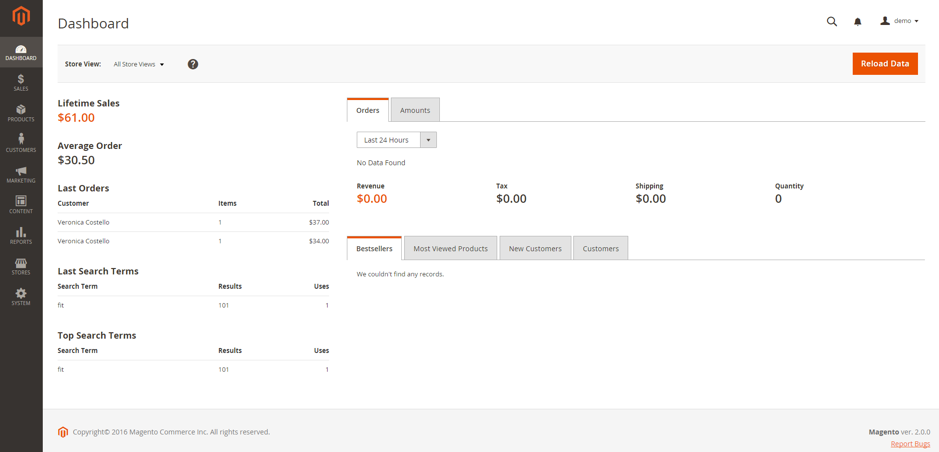
An eCommerce platform that is described as open source is when the original source code for the software can be downloaded and used entirely for free. What’s more, it can be modified or even redistributed and sold.
This makes Magento a great platform to build your online store from the ground up. If you have website development skills you can alter the code and add extra functionalities, tailoring the features to boost the growth of your business.
The freedom of open source software makes Magento an ideal website platform for online sellers who have the technical know-how or can afford to hire a professional web developer.
However, this does mean you’ll be responsible for your online hosting, fixing any technical problems and downloading new software patches. The high level of flexibility enjoyed by Magento users comes at the cost of time, expertise and more responsibility.
If you don’t have much technical knowledge, you may find Magento has a steep learning curve. Even entry level developers can find the software difficult to start with, especially if they’re not familiar with the PHP Zend framework that Magento uses.
Hosted eCommerce platform – BigCommerce.
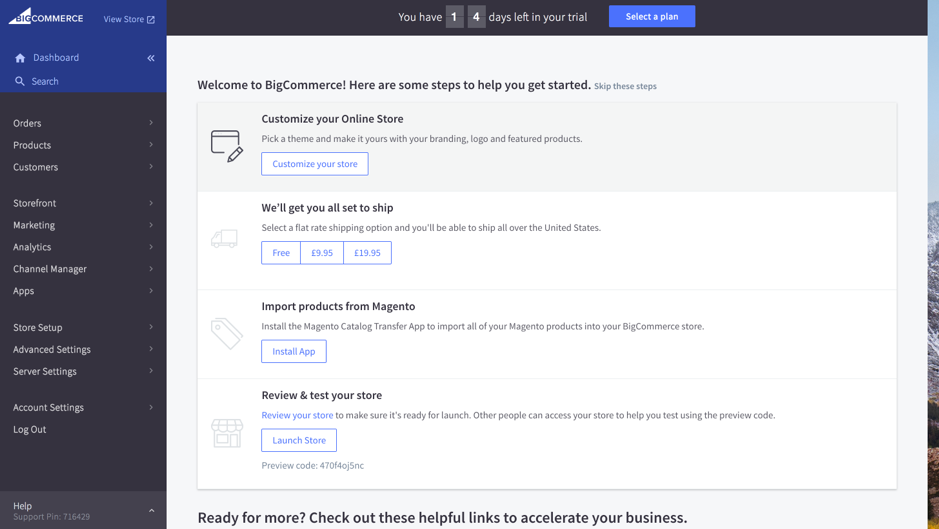
In comparison, BigCommerce is described as a hosted eCommerce platform. This term refers to software that requires little to no special installation and no configuration or modification.
This is great news as you don’t have to be tech savvy to make use of BigCommerce. You or anyone on your team will be able to make use of the eCommerce platform quickly and easily.
The big difference between open source software and hosted solutions is that the latter hosts your store for you.
Because of this, it is also BigCommerce’s responsibility to automatically download software updates for your platform, fix any bugs when needed and ensure that you are PCI compliant.
However, while hosted solutions tends to be more user-friendly than open source software, it does generally mean you have less control and creative freedom when building and customizing your online store.
Price comparison: BigCommerce vs Magento.
Price is an important factor when it comes to finding the best eCommerce platform for your business. Fortunately, both Magento and BigCommerce provide affordable solutions for different businesses.
Price ComparisonMagentoBigCommerce
Community Edition
Free
Requires technical knowledge
High flexibility and customisation
Ongoing costs with no support
Standard Package
£20.95 per month
Less control and customisation
Easy to use with 24/7 support
Sell up to £35,000 annually
Enterprise Edition
Circa £20,000+
24/7 support
Access to advanced tools
Plus Package
£55.95 per month
Three additional tools
Sell up to £106,700 annually
Additional Magento costs to consider:
1) Online hosting
2) Web development
3) Extensions/plugins
Pro Package
£175.25 per month
Three more tools to sell more online
Sell up to £284,500 annually
*Last updated:May 2018.
Alternatively, the three main packages available for BigCommerce customers have set monthly prices, ranging from £20.95 to £175.95. The platform’s enterprise package uses customized pricing and the package is tailored to your needs.
Every BigCommerce package includes unlimited staff accounts and unlimited products, file storage and bandwidth. The eCommerce platform also doesn’t charge you transaction fees on any items you sell.
In comparison, Magento’s open source solution allows you to download the software for free. But this doesn’t mean it’s free to build, maintain and scale your online store on Magento. There are hidden costs that we will get to later.
It’s also worth mentioning that you’ll need to factor in the cost of marketplace extensions and apps to get the most out of Magento and BigCommerce. While several of these are free to use, these extra costs can add up pretty quickly if you don’t factor them in from the outset.
BigCommerce pricing: Standard package – £20.95 per month.
The BigCommerce standard package provides you with everything you need to start selling online within minutes and allows you to turn over an annual profit of up to £35,500. This makes the standard package ideal for start-ups and small businesses new to selling online.
What’s also great about this package is that you can make use of the in-built blog to generate website traffic or enable product ratings and reviews to increase your sales. Check out all the features here.
Keep in mind that all BigCommerce packages include unlimited staff accounts, file storage and bandwidth. The platform also doesn’t charge you any transaction fees on the items that you sell.
BigCommerce pricing: Plus package – £55.95 per month.
The BigCommerce plus package gives you the same benefits as the standard package, as well as three additional features:credit card vaulting, an abandoned cart saver and the ability to target your customers to increase your sales.
Credit card vaulting allows you to store customer credit card data securely, while the abandoned cart saver allows you to win back customers who left your site without buying.
You can also create customer groups and segment your audience in the plus package. This allows you to reward frequent shoppers and set up loyalty programs to encourage more sales for your online store.
BigCommerce pricing: Pro package – £175.25 per month.
BigCommerce pro is ideal if you are an established business and have experience with online selling. You can turn over an annual profit of approximately £284,500. Any bigger than this and you’ll need to investigate BigCommerce’s customized enterprise packages.
As a pro customer, you’ll receive three additional features to boost your sales. These include Google customer reviews, a faceted search feature and custom SLL.
The faceted search feature allows you to use filters to categorize your products. This lets your customers use search filtering to find the items they are looking for quickly and easily. Some product filtering examples include color, size and brand.
Custom SSL makes your online shop far more secure for your customers to use, which has a big impact on people being willing to buy from you.
Magento pricing: How much does the eCommerce platform really cost?
Magento has two eCommerce packages to choose from and they differ in price pretty substantially. You’ll find your decision is influenced by the budget you have available.
Magento pricing: Community Edition – free.
The Magento Community Edition is free to download and use. But that doesn’t mean it’s free to implement. In fact, there are several ongoing costs you’ll need to be aware if you want to make the most out of the eCommerce platform.
One thing to make clear from the outset is that the Magento Community Edition does not include any technical support or customer service. This means any customization must be completed by you, a freelancer or an agency.
As you might imagine, this is where the “hidden” costs start to reveal themselves.
Magento pricing: Enterprise Edition – circa £20,000+.
The Magento Enterprise Edition is likely to cost you approximately £20,000 or more. The two enterprise options available are known as gold support and platinum support.
The paid edition comes with 24/7 technical support and additional benefits to help you sell more online, such as advanced marketing tools and search engine optimization.
A key difference to be aware of between Magento’s Enterprise Edition and its free alternative is that you pay a commission based on the amount of website traffic you receive.
Magento pricing – uncovering the hidden costs.
On the surface, Magento appears to be the more cost-effective eCommerce platform since it is free to download and use. However, there are several ongoing costs you need to be aware of from the outset.
If you’re not familiar with how to build an eCommerce website, you’ll need to factor in hosting fees, website development and the price of any extensions you want to use to scale your online business. These costs can add up quickly if you’re not careful.
Magento hosting.
Magento hosting can be expensive as the eCommerce platform uses more resources than a standard website. Websites built for eCommerce tend to be large and complex, and this impacts how much you will pay to host your online store.
Depending on the size of your shop, web hosting prices fall between £15 to £100 a month.
Magento website development.
The cost of your eCommerce website on Magento can add up quickly. If you don’t have the right resources, you’ll need to factor in the cost of hiring a Magento web developer.
Magento web developers are highly skilled at integration, customization, development and implementation for eCommerce websites, which can alleviate some of the stress that comes running an online store.
The hourly rate for a skilled Magento web developer will cost you between £100-£250 per hour, while the exact the number of hours you will need to account for the creation of your online store will depend entirely on the size and scope of your business.
It is possible to get your website up and running for under £10,000 but if you are looking to outsource web development to a Magento specialist then you will be looking at costs nearer to £20,000 or above.
If you own a larger eCommerce business that sells over 6,000 products or if you are seeking a custom shop theme unique to your business wants and needs, it is likely you will need to invest £40,000 or more.
Magento extensions.
While we’ll delve into detail about the Magento marketplace later on, something to keep in mind is the cost of any extensions and apps you want to use for your online business.
Most Magento sellers make use of multiple extensions to grow their eCommerce business, for the simple reason that eCommerce platforms aren’t built for robust order processing or supply chain integration, among several other factors.
While a lot of the apps are free to use, the majority fall within the range of £100 to £1,000. However, there are extensions available that cost upwards of £15,000.
Magento vs BigCommerce: How user friendly are the platforms?
Magento and BigCommerce are pretty different when it comes to ease of use and user friendliness. While both are well designed, the two eCommerce platforms have been created with different skill sets in mind.
This section separates the usability of BigCommerce and Magento into three key areas:
- Setting up your shop
- Maintaining your online store
- Integrating additional services and software
Consider who will be the primary user of your eCommerce solution. Will it be you or will someone on your team be responsible? What are your capabilities like?
Setting up your shop: BigCommerce vs Magento.
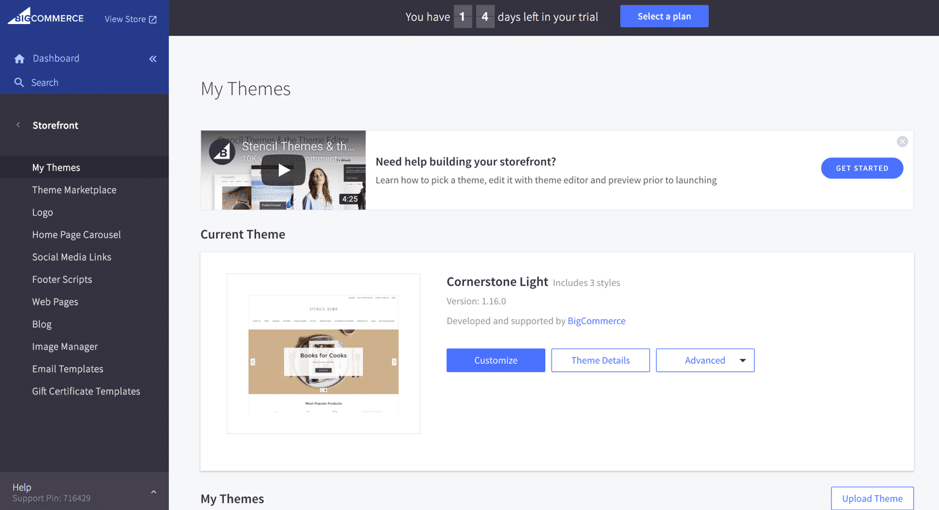
BigCommerce is an extremely user-friendly eCommerce platform and you, or anyone on your team, will be able to set up your shop and sell your products within minutes.
The eCommerce platform is intuitively designed with a drag and drop website builder to help you create and customize your online store. This means you don’t need to know how to code to start selling your products online, unlike Magento.
In comparison, setting up a Magento eCommerce store requires you to download the software from its website. After installing, hosting and configuring the software, you’ll be presented with a clean but more complex interface to get to grips with.
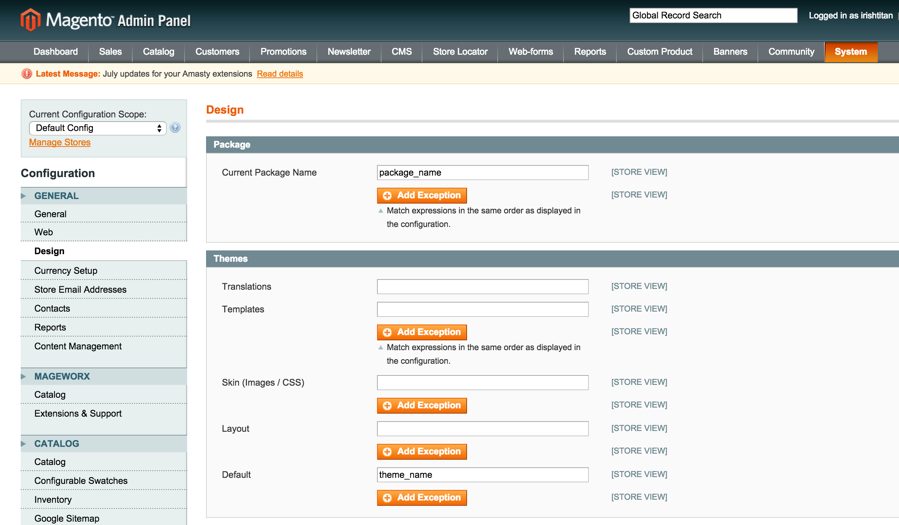
In order to get your Magento shop up and running, you’ll need to set up online hosting, understand web development and know how to code or be able to afford a professional to help you.
However, this isn’t to say setting up a shop on Magento is impossible if you’re not tech savvy or don’t have a big budget to spend.
The platform does have a steep learning curve, but you can teach yourself to install and configure your shop using online guides and communities, providing you can invest the time to learn and teach yourself.
Maintaining your online store on Magento or BigCommerce.
As BigCommerce is a hosted all-in-one solution, maintaining your shop is relatively hassle-free process. The eCommerce platform owns everything related to its application, which can take away some of the stress from online selling.
For example, as BigCommerce takes care of hosting your store online, it is responsible for updating your software and will do so automatically when needed.
If there are any problems with your website, the BigCommerce customer service team will be on the case, making it an ideal platform if you’re new to selling or don’t have the resources to help you right now.
However, this means that BigCommerce also has access to the data belonging to your online business. If you’re looking for complete autonomy over the information about your business and customers, this may be a deal breaker for you.
In comparison, maintaining your online store on Magento requires technical knowledge. As there are so many features and options offered by the website platform, you will need to invest the time to learn or have the money to pay a professional to help you.
A key difference between the two eCommerce platforms is that Magento puts the responsibility of its infrastructure and administration of its platform into the hands of its users.
While this level of control can be a big advantage, it does mean you are responsible for ensuring your software is up to date and fixing any on-site problems you may have – unlike BigCommerce.
Ease of integration: BigCommerce vs Magento.
While your website forms the foundation for your online business, it is not likely to be the only software you use. This is because eCommerce platforms aren’t built with every single function in mind.
For example, you may use (or be planning to use) additional systems to help you with supply chain integration, processing your orders or managing your product information.
The best thing to do is to make a list of software you need your website platform to integrate with. You may also find it useful to note down any software you think will be a good fit for your business in the future.
Both Magento and BigCommerce integrate well with other systems and software, which is great news. However, there are some usability factors to take into consideration.
As BigCommerce is an all-encompassing solution, it is easier to integrate other services and software you use. In comparison, Magento is more complex because the software is open source, which means service integration can be more challenging.
Your Magento integration projects are likely to be more time-consuming and unpredictable than with BigCommerce. This is because you’ll need to work closely with the merchant and its agency to ensure your service integration is successful.
As a Magento seller you are able to integrate with almost any other service and software, unlike BigCommerce which only lets you integrate with approved marketplace sellers.
On the other hand, as a BigCommerce shop owner you won’t need to worry about security or reliability of services you can integrate with as they have been approved by the platform.
BigCommerce vs Magento: Security.
Every eCommerce seller has to be PCI compliant. This enables your online business to accept and process credit card payments safely and securely.
As BigCommerce hosts your online shop, it is the platform’s responsibility for ensuring all of its online sellers are PCI compliant. Knowing that this is taken care of by BigCommerce can relieve some of the stress attached to running your business.
In contrast, selling on Magento means you’re responsible for ensuring your business meets the PCI compliance standards. This is because you control the online hosting for your eCommerce store.
Magento vs BigCommerce: Branding and design.
How your website looks has a big impact on how likely people are to buy from you. This is why it’s important to consider how you want your online store to look from the outset.
While BigCommerce doesn’t let you design your own store from scratch, it does provide a variety of responsive and customer-friendly shop templates.
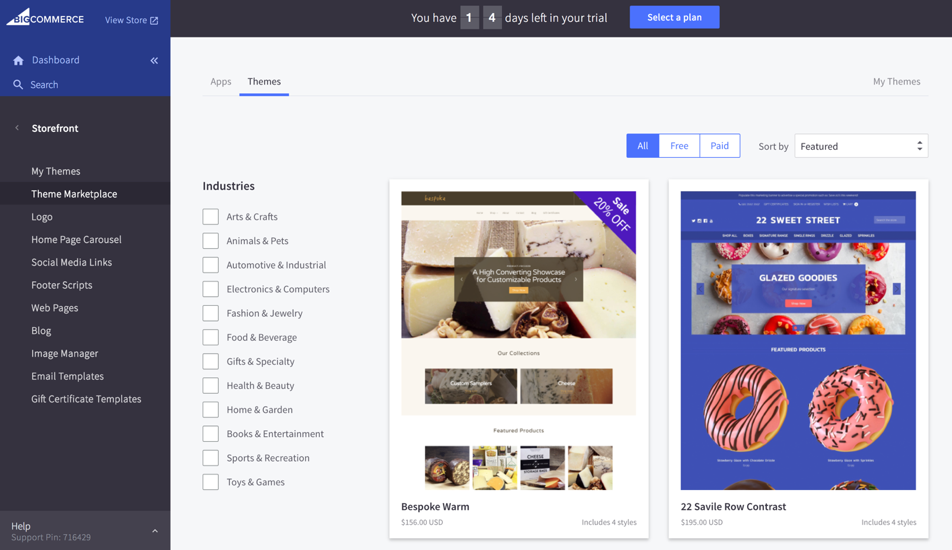
Seven of these shop layouts are free to use, while the remaining BigCommerce templates cost between £100-£165. The pre-made shop templates are easy to implement and customise as the eCommerce platform uses a drag and drop website builder.
However, you are restricted in how much you can customize your online store.
If you want to be able to customize more than basic design elements like your store fonts and colors, BigCommerce may not be the best eCommerce platform for you.
As Magento is open source, you can customize almost any aspect of your online shop. This level of flexibility and freedom is often the reason so many people choose Magento over other eCommerce platforms.
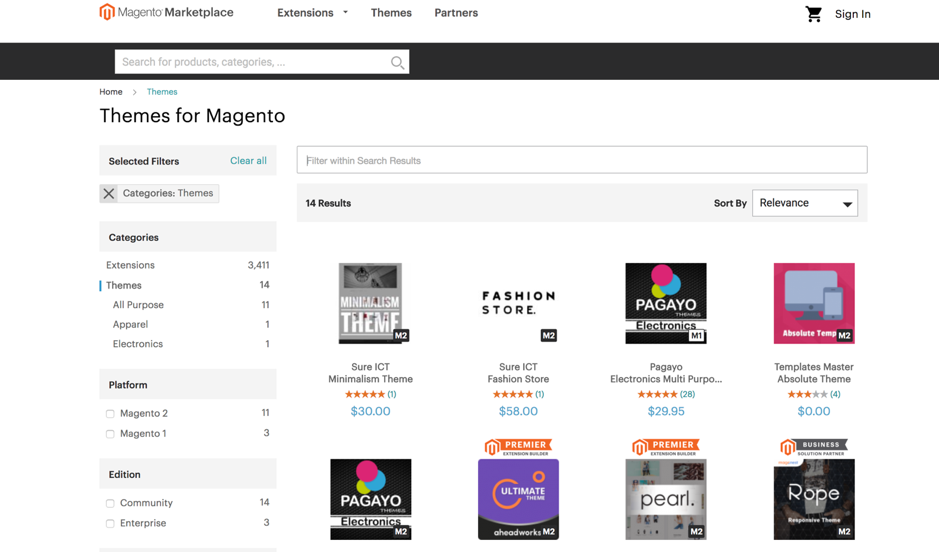
There are also a variety of pre-made shop layouts available on the Magento marketplace and from third party websites. These range from being free to costing in the thousands.
BigCommerce vs Magento: Marketing features.
You could have the most brilliantly designed online store in the world, but if no one can find your website you’re not going to have a business for very long!
As an online seller, driving traffic to your website and converting your visitors into customers is likely to be one of your main business goals. This is why it’s important to consider how your eCommerce platforms will complement your marketing strategy.
Three key areas to drive traffic to your eCommerce business and boost your sales include:
- Search engine optimization
- Email marketing
- Social media marketing
Search engine optimization (SEO).
SEO is the process of optimizing your website to improve your ranking on search engines. This helps you to generate more traffic for your eCommerce store, and this boost in visibility is likely to increase your sales.
As Magento is open source, you can optimize your website for search engines as much as you’re capable of. The eCommerce platform also has access to Google Content API.
Both Magento and BigCommerce allow you to create clean URLs and edit your metadata for your products so that search engines can crawl and rank your website more effectively.
BigCommerce also integrates with Google Shopping support and comes with a Robots.txt file with product-specific keywords, which you can edit to improve your search ranking.
Both eCommerce platforms can be created to include a blog, which is a great way to boost your search ranking. You can use a mix of short and long keyword phrases to help your target audience find your online store more easily.
Magento and BigCommerce break fairly even when it comes to complementing your SEO strategy. The two eCommerce platforms offer a similar level of options to optimise your pages for search engines to crawl efficiently.
Email marketing.
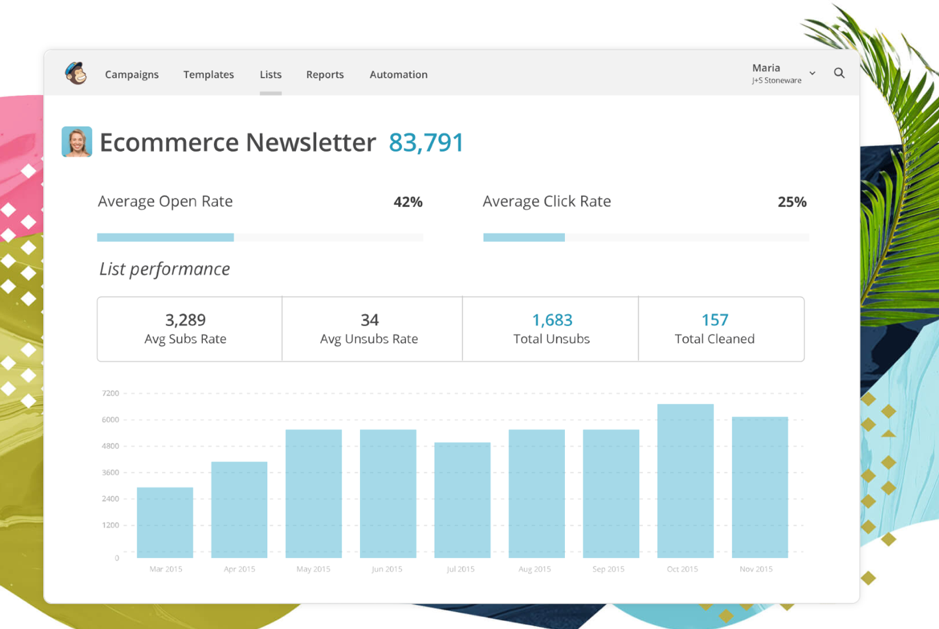
Magento and BigCommerce both offer free integration with email automation software (e.g. MailChimp as pictured above) from their marketplaces. This makes email marketing an even ground when comparing the two eCommerce platforms.
Social media marketing.
Social media can play a vital role in generating traffic for your online business. A strategic presence can build brand awareness, develop lasting relationships and create a community of loyal advocates for your business.
While Magento has plenty of apps and extensions that help you to share and sell your products on social media, the eCommerce platform does not come with any in-built service to support your presence on social media.
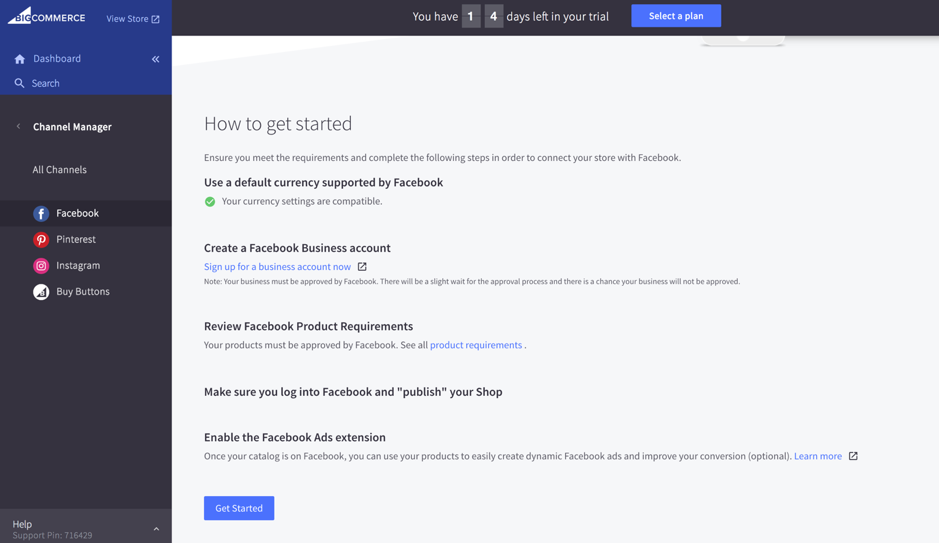
In contrast, BigCommerce provides an option through its Channel Manager feature to sell your products through Facebook, Instagram and Pinterest. You can also make use of social buy buttons to encourage more sales across your site.
Magento vs BigCommerce: Support, resources and community.
What level of support and resources are you seeking from your eCommerce platform?
Depending on your capabilities, customer support may feature pretty highly on your list of priorities when it comes to choosing the best eCommerce platform for your business.
BigCommerce offers its users 24/7 live chat technical support regardless of what package has been opted for. The website platform is also contactable through email and phone, covering most bases for its customers.
The company’s resource centre helps you to learn more about selling on BigCommerce through articles, guides, eBooks, videos and additional content formats.

There is also a growing online community forum to discuss problems and ideas with other BigCommerce customers, staff and partners.
In comparison, Magento offers no customer support unless you pay for its enterprise addition. This is because the software is free to download and use.
However, the Magento website platform offers a large resource library filled with videos, webinars and guides to help you sell more online and get the most out of Magento.
Where Magento really excels is its large online community of developers and customers who share tips, tricks and give support to one another.
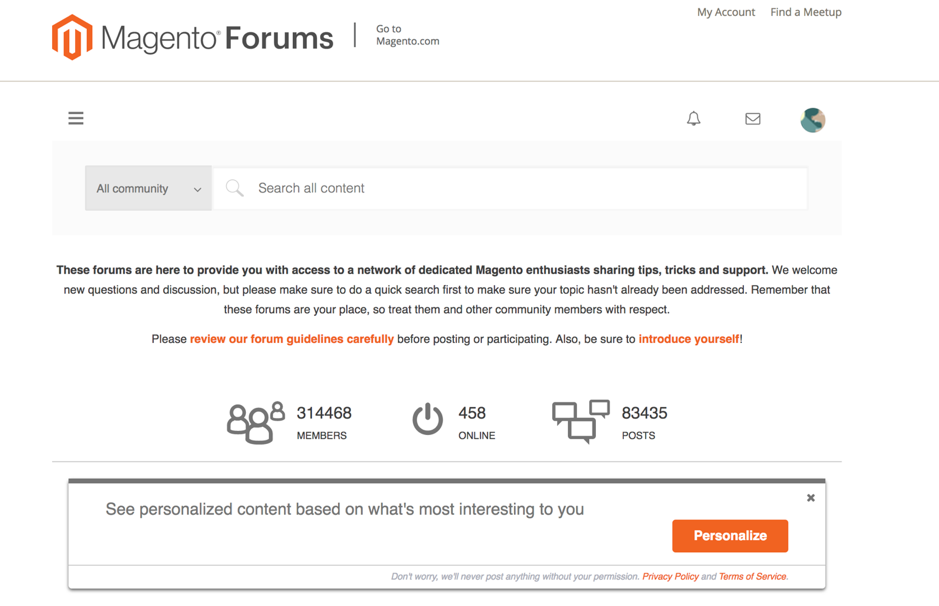
In comparison to BigCommerce, Magento’s online community is more established and more active, partly because the software is more widely used across the world.
BigCommerce vs Magento: Extensions and plugins.
When it comes to extensions and plugins to customize and grow your online store, both Magento and BigCommerce rank pretty well.
Ultimately, what this battle comes down to is your personal preference on the additional features you’re seeking from your eCommerce platform. If you’re new to selling online, make a short list of features you may like to use in the future.
Let’s have a quick look at what’s on offer from each company.
Magento has a large marketplace with over 3,300 extensions available to help grow your business; however, approximately 1,800 of these are compatible with the second edition of Magento.
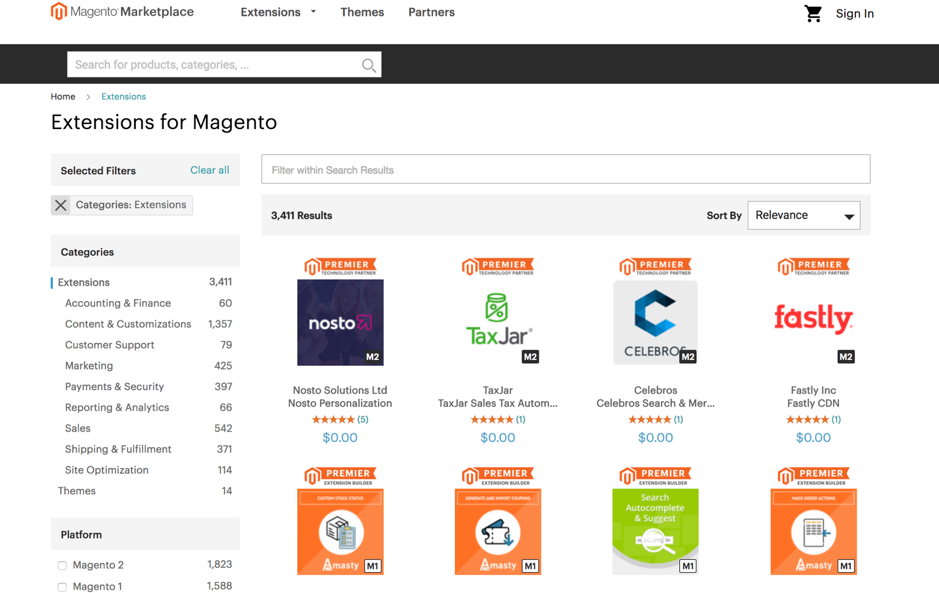
These plugins are created by staff, business partners and independent developers and cater to a number of different business needs. This includes (but is not exclusive to) content and customizations, shipping services and order management extensions.
The price of Magento extensions vary from being totally free to approximately £15,000. The most common price range for its marketplace is £100-£1,000.
In comparison, BigCommerce provides just over 550 extensions for its online sellers. While this is less than Magento, the BigCommerce marketplace covers the same business needs.
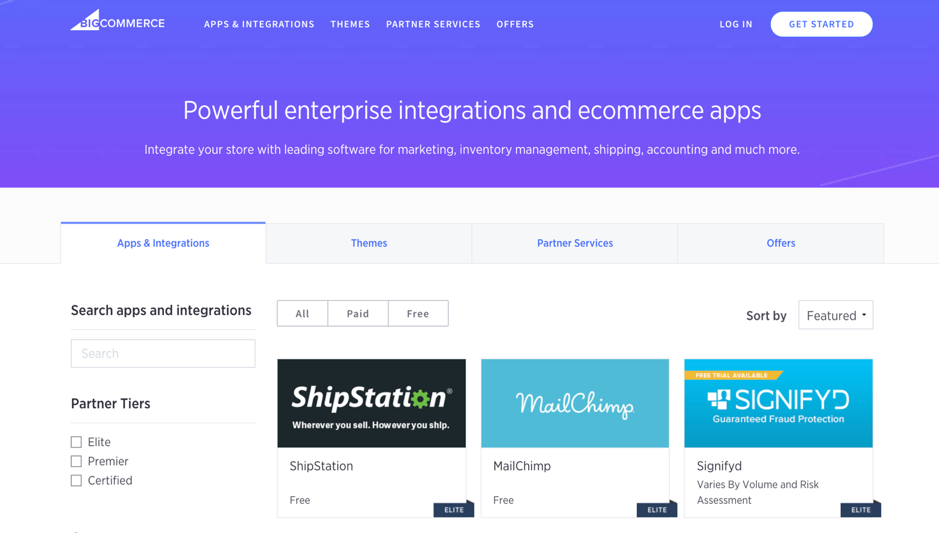
BigCommerce marketplace extensions range from being free to approximately £1,400.
This is significantly cheaper than Magento, so it’s worth investing some time to research what’s on offer from both eCommerce platforms to get the most value for your money.
It’s also worth taking note as to whether the extensions you want are a one-off price or whether you’ll need to factor in monthly ongoing costs.
Plus, if you haven’t given it some thought already, consider what inventory management software might be a good fit for you once you start receiving a steady stream of sales.
Not only will this help keep track of your inventory and stock, but you’ll be able to scale much faster and more easily, as your team will only need to learn how to process orders once.
Magento vs BigCommerce: Scaling your online business.
Where do you want your business to be in the next few years?
While this answer may not be high on your list of priorities right now, you may find giving it some consideration helps you to choose the best eCommerce platform in the long run.
There’s nothing worse than making a big purchase and a few months later coming to the realization it wasn’t for you. We’ve all been there. When it comes to eCommerce software, it can take a lot of time and money to transfer your business to a new platform.
Taking the time to consider the direction you want your business to grow in the future is highly likely to save you on costs and mistakes further down the line.
Magento offers close to limitless opportunity to scale your business online. As the eCommerce software is open source, there’s not really a cap on what you can achieve, excluding your imagination or technical know-how.
The flexibility and freedom that comes with Magento means you can add multiple marketplace features or even create your own extensions tailored to your needs. The opportunity available for scaling your business on the platform is huge.
BigCommerce also provides opportunities to scale your online store, but the website platform does not enjoy the same flexibility as Magento.
While BigCommerce doesn’t charge you transaction fees, the packages are capped when it comes to the total annual income you can make. This varies from approximately £35,500 for its standard package to £284,500 for BigCommerce pro users.
BigCommerce vs Magento – who wins the round?
You should now have a much better understanding of BigCommerce and Magento and the advantages and disadvantages of the two eCommerce platforms.
So, who comes out on top in this comparison?
Unfortunately, there’s no clear-cut answer anyone can give you. It all depends on your own capabilities and business needs. If you hear otherwise, try not to be persuaded! After all, it’s your money.
This is why it’s important to take the time to consider what you want out of an eCommerce platform, not to mention you’ll be saving on costs further down the line by making the right decision from the outset.
If you’re new to selling online or small business that requires software that is simple to understand and use, doesn’t break the bank and offers plenty of customer support, BigCommerce may be the solution you’re looking for.
On the other hand, if you consider yourself tech savvy (or have the time and resources to learn or to pay a professional) you may find Magento and its high level of flexibility means it’s the right choice for you.
Of course, there’s nothing to stop you from downloading Magento’s software to see how easy or difficult it is for you to use. You can also trial BigCommerce for free for fifteen days.
The bottom line.
Ultimately, both BigCommerce and Magento are good eCommerce platforms with great developers that tailor their software to different types of customers. Knowing what you need and what your current capabilities are goes a long way in determining your decision.
Still can’t decide? Drop us a message below and we’ll try our best to help you.